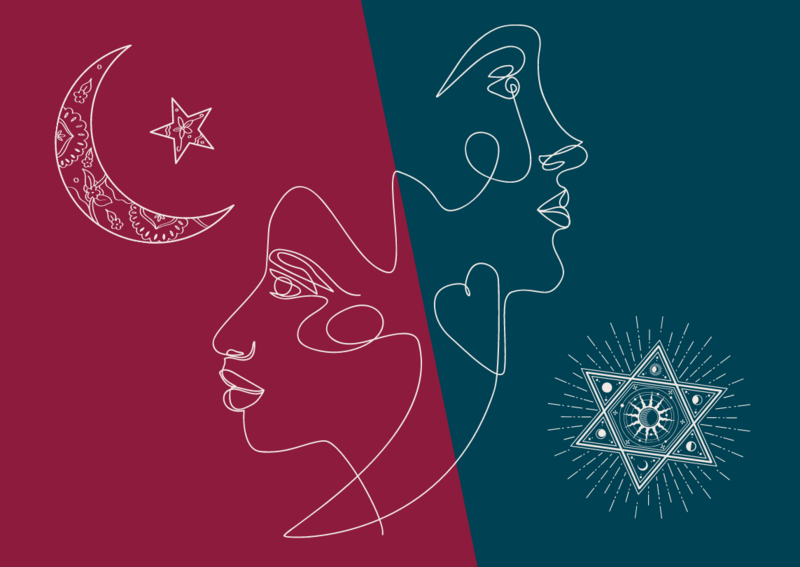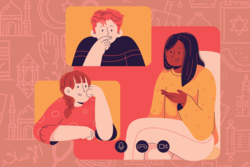I’m Jewish. My Partner is Muslim. Here’s How We Make It Work.
“So…uh…would you ever date someone of a different religion?”
That was the question my partner, who I’ve now been with for two years, coyly posed to me a week before asking me out.
“Of course,” I replied. I had never thought of religion as a disqualification for dating.
“Even a Muslim?” he asked.
My answer remained unchanged. I grew up in a tolerant Jewish household. I didn’t see religion as a barrier, but rather as a shared passion, something my partner and I had in common.
Two years later, I realize my perspective was simplistic, maybe even naive. While my partner and I have learned to connect across religions and turn our interfaith divide into a strength, it wasn’t always that way.
While I told my mother excitedly about my partner as soon as we started dating, I remained a secret to my partner’s parents for the first three months of our relationship. It bothered me, as much as I tried to pretend it didn’t. He said he wasn’t that close with his parents, but I knew he called them every day. He made a vague reference to his parents not approving of our relationship, but I knew there was more to the story. I felt like I was the big Jewish secret he had to keep to maintain the image of the “perfect Muslim” he tried to portray to his parents.
As it turned out, I didn’t stay a secret for long. My partner’s parents learned we were dating after snooping on his phone and seeing heart emojis in our text messages. Not surprisingly, they didn’t take it well. It went against their religious values for him to date anyone, let alone a non-Muslim—they viewed the act as haram, or forbidden by Islamic law. They told him they felt angered and disappointed and that they thought I would distract him from getting good grades, getting into a good med school, and being a good Muslim.
They also told him they’d assumed he would have an arranged marriage, as they did. They felt hurt by his choice, as the oldest child, to set a bad example for his siblings by going against their wishes. Though they didn’t use these exact words, I knew they also saw me as a loud and outspoken Jewish girl, someone very different from the match they would’ve chosen for him.
While my family members reacted better, several still had questions. One relative asked if I was done with Judaism, half-joking that since I’d delayed my bat mitzvah until I was 17 (a choice I made after by father died when I was 12) and now was dating a Muslim, I must not take religion very seriously.
I didn’t know how to respond. I wondered if maybe he was right. Underlying the assumption that I had a fickle relationship with religion, I think, was the idea that as a woman, I would allow my identity to be swept away by whomever I dated. As much as I disagreed with the sexist premise, I also couldn’t shake the worm of insecurity that it was true.
To combat these feelings, I decided to reaffirm my Jewishness by reciting the Ve’ahavta prayer each night before bed. Just as some people pinch themselves to make sure they’re not dreaming, my nightly recitation of the Ve’ahavta served as a check-in. Was I Jewish? Yes. I could recite the Ve’ahavta. I could read Hebrew. I was Jewish.
My partner didn’t know me well enough to see the nightly recitations as a change in my behavior. In the face of his devoutness, I had been reluctant to reveal my relative lack of religiosity. He prayed every morning, bowing before God before reading from the Quran. How could I compare? I tried to put as much feeling into the Ve’ahavta as I could, but it felt like I was just beginning my relationship with God, whereas my partner had maintained a spiritual connection for years.
Spiritually lost and confused, I sought out the rabbi at my college. Did dating someone in another faith group invalidate my Judaism? I asked him. Was it even worse that my partner was Muslim? Given the historical tension between the two religious groups—a tension that has persisted into the present day—I couldn’t help feeling that maybe I’d let my ancestors down.
Instead of answering my question, in true Jewish fashion, the rabbi posed a question back to me: Why should dating someone of another religion make me any less of a Jew? He gave me readings about communities of Muslims and Jews that have lived in harmony, and about different ways that Jews throughout history have connected to and rooted themselves in Judaism through Buddhist and interfaith practices. These texts challenged me to think about my relationship to both Judaism and Islam, as well as to reconsider my need to be an “A+ Jew".
I also reached out to the on-campus imam. I wanted to learn more about Islamic beliefs and practices, especially about love and the treatment of women. I wondered if everyone in the Muslim community would view me as corrupting my partner, leading him down a path of sin. The double-standard was frustrating to me: Why was I seen as a distraction to him, but not the other way around? I felt I was dismissed for being a woman—and to make matters worse, not even the “right” woman.
What I read surprised me. Islamic texts mostly discouraged dating because of the prohibition against pre-marital or casual sex, or having a bond that included physical intimacy as well as an emotional connection. In some ways, this value seemed almost feminist—discouraging men from viewing women as sexual objects and encouraging them instead to foster an emotional connection.
This intersection between Islam and feminism was as eye-opener for me. What surprised me even more was learning how feminism extended to the Islamic practice of veiling, which many Western women (including me, in the past) perceive as a sign of female oppression instead of emancipation from gender norms. In her book The Veil and the Male Elite, the scholar Fatima Mernissi explores of how veiling has intersected with feminism throughout history, noting that many women prefer being covered and knowing that they will not be judged by their looks but rather by their characters.
After learning about the Muslim practice of veiling, I immediately began drawing parallels to the Jewish practice of bedeken performed at weddings to evoke separateness and holiness. I realized that I’d found a point of intersection between Jewish and Muslim feminisms, one that pushed me to expand my Westernized vision of feminism. This interfaith feminism allowed me to develop a sense of connection with women from both religions, exploring and connecting over our similar (and different) experiences.
Even so, when mutual friends asked us if I would start veiling myself in line with Islamic tradition, I bristled at the implication that I would have to hide my body because of my relationship status in a way that my partner wouldn't. After all, I wouldn’t ask my partner to wear a kippah; it seemed sexist for people to expect him to ask me to veil. This reminded me of the practice of changing last names after marriage. Just as women are sometimes expected to leave behind their “maiden name,” so too are they expected to ditch their culture in interfaith relationships to conform with that of their male partner.
But that isn’t who I am. And unlike before, when I felt the need to be perfect in the eyes of both Judaism and Islam, I realized that part of my religious growth would be accepting who I was, even when I fell short of the high standards prescribed by both religions. I grew comfortable with the challenge of navigating interfaith differences—and similarities—as I knew it would be a long-term project for both of us.
Celebrating our differences has also brought my partner and me closer. We have developed the term “cultural moment” to describe situations where we feel a difference in how we were raised. The first time my partner attended an on-campus Shabbat dinner with me, I remember feeling disappointed when he looked slightly uncomfortable holding the thimble-sized cup of Manischewitz wine during kiddush, didn’t join us in drinking after we toasted l’chaim, and only ate a few vegetables in the meal that followed, instead of packing in the roast chicken. Later, I asked about his reluctance to join in. Did he not want to share in my religious traditions?
He did, he explained, and apologized if it had seemed otherwise. Unlike Judaism, Islam forbids drinking entirely, and so while it is traditional in Judaism to enjoy a glass of wine every Friday, he couldn’t partake in this tradition. As for the meat, he explained that after doing a lot of research, he concluded that he couldn’t eat it. Despite the similarities between kosher and halal meat, he learned that unless meat was doubly blessed and processed according to both traditions, falling into one category would not mean that it fell into the other. I appreciated his thoughtfulness and realized that part of our relationship as an interfaith couple would entail such intentional learning, as we both sought to respect our own religions while appreciating the other person’s. (We quickly came up with grape juice as an adequate substitute for the wine.)
Interestingly, engaging in interfaith dialogue and hearing about other people’s religious practices and connections has also made me feel more comfortable in my own Jewishness. Eventually, I stopped going through the motions of the Ve’ahavta, and instead devoted the time before bed to a mindfulness practice of gratitude and yoga. I realized it’s OK if I’m not the one with the most “God points.” We are all seeking meaning and beauty in life, and we all find it in different ways.








Very mesmerizing details. Deeply touched
Wait. Hang on. This is a great post on Diversity.
But every Muslim man knows that a Muslim man can marry any devout Christian(lady) or Devout Jew(lady). There are no barriers to that.
The Muslim man MUST also allow the devout Christian(lady) or Devout Jew(lady) practice her faith independently.
Please look it up.
and Good luck on your relationship.
Hi Zia, Thank you for sharing. Living in an interfaith marriage has challenges but is not impossible. You didn't mention the greatest challenge. Your kids would be Jewish by halacha. How would your Muslim husband embrace this fact.
I guess, based on your post, there is another challenge of your relationship. Irrespective of the type of religions, he is more observant than you seem to be. I guess, you follow Reform practice, just based on that you called the prayer veahavta. Most observant Jews would call it Shema Yisrael. A difference in the level of observance may cause problems in the relationship later on.
Now if you embrace the differences, a whole new world may open up for you. My great grandparents were Spanish-speaking Jews living in Sarajevo. While intermarriages with Bosnaks was still uncommon, the two communities lived in mutual respect and support. The ties were closer than with the Christians. As you learn about Islam and your partner learns about Judaism, you'll find a lot of similarities. While many in my family speak Arabic as a second or third language, I don't speak the language. However, I can guess about half of the words just by their similarity to Hebrew. E.g., on the weekend I made lamb with the spice mix Ras al Hanout. What does it mean? Rosh shel Hanut = head of the shop, i.e., the best <spices> in the shop. Also, the esthetics of the Jewish service, particularly the melodies, are almost identical to the Muslim service, at least in a typical Sephardi kahal.
If you want to find a common ground, go with him to the masjid, wear a veil. Jewish women in the Arab world did it all the times. Also explore a Sephardi Kahal and if you like it, take him there. I expect, you both will feel welcome there and enjoy the warmth. B'Shalom.
Hi,
My name is Corey Seemiller, and I co-host a podcast called Rock That Relationship! Our target audience is lesbians and women who love women and aim to provide stories, resources, and guidance to help them in creating thriving relationships. We are doing an episode on interfaith relationships and I just came across your story. Might you be interested in being interviewed on our show? You can find out more at rockthatrelationship.com and listen to previous episodes.
Thanks!
Corey Seemiller, PhD
So what about children? How would you raise them? What is your daily life like? How do you actually combine both religions?
I wanted to reach out to you to talk personally for some more advice. My partner is Muslim, I am Jewish. We met a couple of months ago, way after Oktober 7th. We are both able to differentiate between our people and us as individuals. However, the people of my congregation feel betrayed by me being in a relationship with what they see as the personification of the enemy. I struggle. Discussions end in a wall all of the time. While I can understand some of their points, there’s 0 understanding from their side. I didn’t choose to fall in love with this person. We both want peace for everyone.
I like your openness to understand and reconcile the differences
this post really resonated with me. i’m born and raised hindu, and my boyfriend of nearly 4 years just revealed to me that he’s christian. i had a gut feeling this would happen because he attends a christian-adjacent college, but it was still a shock to me because he originally identified as buddhist. my emotions are still all over the place, but what first got to me was not feeling worthy enough in my own faith. just like you, i am not the most devout person and i have so much to learn, but it is a massive part of my identity, culture, and upbringing. i keep comparing myself to my boyfriend and am almost jealous with how sure is is of his faith while i feel like a blubbering idiot trying to grasp at my own. part of me also got triggered because i dealt with some nasty religious trauma at a young age, and i definitely let some of my intrusive thoughts get to the best of me. reading your blog post was extremely comforting and helps me process my new emotions much better. i hope to be supportive for my partner’s spiritual journey.
Erm lots of things wrong here, men are allowed to marry NON Muslims but only Abrahimic Religions eg Jews and Christian’s. As we all believe in 1 God. As long as the children are Muslims the wife does not need to be Muslims. As a father to the children on the day of judgement we believe we will have to answer to god regarding our children’s upbringing eg why did we not guide them to the straight path.
Yes I’m Muslim… jwas gril with marriage
Amein/Ameen! Beautiful!
Not true, I was married to a Muslim for 14 years. True Christians are monotheistic. I do not know where you came up with that at all. I lived it.
I mean Islam is basically a copy of Judaism, they both used to live together before the creation of the state of Israel as Palestinians with 3 different religions. Most the problems aren’t religious but political and mainly because of Zionism. So I think it would be harder to marry a pro Zionist and anti Zionist than a Muslim and Jew. Unless this is the case for you guys then it is a lot of compromise about political stuff. Either way it’s good and people should open up more and maybe it will help solve more problems in the world because being closed off into groups we tend to vote for more wars and other acts of aggression towards each other
If you know it is political why are you against Israel as a state. Palestine was a product of colonisation. The reclaiming of Israel is an act of decolonisation. The Qur’an itself talks about the land of Israel belonging to the tribes of Israel.
COMPLETELY WRING Kosher (minus wine) is actually more halal than halal. I’m muslim btw. I eat kosher everyday as it more nerves are removed and it is salted and just cleaner overall. Also the Elohim is just the Hebrew translation of Allah and before our prophet ALL the prophets were hebrew speaking people.
If a man doesn't mind being with a woman of a different religion, and he doesn't mind a woman of his religion (even if she is close to him, e.g. sister, daughter, even mother) being with a man of another religion, don't be with that man, don't enter into a marriage (or a relationship, of course) with him. Muslims are allowed as men to marry non-Muslim women who are Jews and Christians, and it is forbidden for a Muslim woman to marry a non-Muslim. Do not marry Muslims! I think it is good for marriage to have unity in faith. The truth should be sought. Jesus Christ is the Truth. Ask, and it shall be given unto you; seek, and ye shall find; knock, and it shall be opened unto you. Because everyone who asks receives; and who seeks finds; and he that knocketh, it shall be opened unto him. Look up the Gospel of Matthew (7:7,8).
In reply to If a man doesn't mind being… by Стефан/Stefan
“Muslims are allowed as men to marry non-Muslim women who are Jews and Christians”. Nope we can only marry Jews in today’s context as Christians believe in the trinity and not true monotheism.
In reply to “Muslims are allowed as men… by Arash
If Christians believed in true monotheism then what would be the point of Islam?
In reply to If a man doesn't mind being… by Стефан/Stefan
Amen!
Don't worry what others think. You do what's best for the relationship. Islam and judaism are similar
A Muslim male can marry a non Muslim female if of the book ie Jewish or Christian but a Muslim woman cannot marry a non Muslim and so many other can't do and can do's. So anonymous is wrong in writing, "no one is less This or that fur marrying outside one's religion. It might be okay for a Christian or Jew but a Muslim woman can't marry a non Muslim because it's Haram like so many other things we take for granted and think everyone else is likeminded...... I'm not Muslim but American and just commenting.
Never had a real Muslim friend... the religion says OK to be fair minded and thoughtful age neighborly to non Muslims.... but beyond that, not good to be much more
I read yoga (which you mention at the end) is haram for a Muslim also.
So many things that are so different....
Hi there! This is so nice to read as I am in the current situation (in dating) and would love to connect for some advice and just someone in the same situation! I would REALLY appreciate it!
Kosher is not the same as Halal and the vast majority of Muslims do not eat kosher just like the vast majority of Jews don’t eat halal. Totally understandable on eitgodide. Please don’t say the prophet (pbuh) ate kosher.
I disagree that relationship between Muslims and Jews has been tense in history. It has only been tense since the creation of Israel. If Israelis were Buddhists, Hindus, Christians, or even some different European Muslim sect, the tension would still be there. This animosity has nothing to do with religion of the people of Israel and Palestine. It has to do with the fact that Israelis are perceived as invaders and colonizers, no different than British or French.
In reply to Kosher is not the same as… by Shirin
Exactly. Couldn't agree more.
Hello,
Firstly, this was really inspiring. I am a Jewish woman. I was raised in a modern family, however, one that is practicing. When I first started to date my boyfriend of 2.5 years, I felt a lot of external and internal conflict. I thought I was wrong, and certain family members definitely thought I was doing something wrong.
With time and many moments of panic (in which I questioned and doubted our relationship), I found immense joy in embracing both religions and picturing a future in which both are equally present and celebrated. I have spent so many time listening to the music, learning phrases in his family's language of origin, learned about the food, etc.
While the idea of an interfaith relationship may feel incredibly inappropriate, distasteful and sinful to others, there is also an extreme beauty in it. It is also becoming reality, more and more.
I understand why many people feel as thought it's wrong and don't support it. I was one of those people too. However, in a world that is very lonely, isolating and upsetting, don't we all deserve to be happy within our relationships? Being with the people who make us feel most loved?
Religion is important. I value it very much. But, being in an interfaith relationship does not discredit or invalidate anyone else's faith. No one is less of a Jew, Christian, Muslim or whatever, because they are with someone of a different faith.
May peace be upon everyone <3.
Hi,
Thank you for sharing your story.
May Go-d Almighty bless you so you'll see revealed success in all matters, physically and spiritually.
You've mentioned that you would recite the Ve’ahavta prayer daily and that now you've opted to do meditation and yoga instead.
If it's ok to share my opinion with you which I hope would be helpful, then I would recommend the following:
Return to the Ve’ahavta daily prayer and COMBINE it with the meditation and Yoga.
There is so much what to mediate on the Ve’ahavta prayer. The Ve'ahavta prayer is actually a continuation of the Shema prayer. Just to have a general base for meditation on the shema/Ve'ahavta prayer, I would recommend you to watch this following clip and try to mediate upon this info when you repeat this prayer. It may take a lot of effort and time to have it internalized, but it's absolutely a worthwhile endeavor.
Here's the link https://youtu.be/ggsyvkuCxns
When you're ready for the next step, there's so much more tho this seemingly simple prayer. They are many other lessons and classes that would give you even more insight once you've mastered the lesson from the video attached.
May Go-d Almighty help you and be with you at all times.
Maybe there be peace upon the world.
Bro your husband isn’t a good muslim anyways its haram to date may allah guide him
In reply to Bro your husband isn’t a… by Anonymous
I’m muslim and a very high percentage of muslim men (women less so) in the west date (except a few really conservative muslim communities) so it’s hypocritical for you to insinuate that muslims that date are bad muslims since you probably wouldn’t call a muslim that was dating a muslim woman in the west a bad muslim.
What are you doing is prohibited in Judaism but in America ou guys don't care about Judaism at all unless youre ultra orthodox this is from what i witnessed its VERY taboo here in Israel if something like this happen it brings shame upon family
In reply to What are you doing is… by FFFFFF
We care about Judaism whilst you care about nationalism
Also agree with the comment about it being very strange he wouldn’t eat kosher meat. As a Muslim who was raised in Saudi Arabia, and someone who knows the religion well, we can absolutely eat kosher meat (the Prophet Muhammad ate kosher meat, and didn’t even inquire about meat served to him on another occasion.) Muslims are also encouraged to have moderate views, and rejecting and nitpicking kosher meat is ridiculous. Hate it when Muslims Cherry pick and choose their extremism — he is ok with dating before marriage (which is not accepted), yet won’t eat kosher meat (which is widely accepted by Islamic scholars.)
You’ll get there. I love that you’re both persevering with the relationship, regardless of all of the obstacles you encounter. Jews and Muslims have more in common than not. And that aside, you’re both part of the human race. He’s lucky to have such a smart, open-minded, honest lady in you. Good luck in your relationship.
Wow, I though that I was the only one. My husband is muslim, when our families fought he never once blinked an eye to come to my defence. After 32 years he still worships the ground that I walk on. Our kids chose their own paths and religion.
In reply to Wow, I though that I was the… by Saara Cohen
Hi Saara,
Hope you are doing good
I would like to request you to please you also share your story of love and harmony
Amazing story! May G'd bless you and your husband! Thank you very much!
Very strange that he will not consume kosher meat, kosher is accepted as permissible for Muslims by the majority of orthodox scholars.